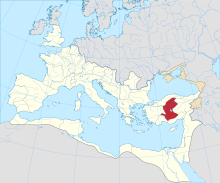lingvo.wikisort.org - Language
Galatian is an extinct Celtic language once spoken by the Galatians in Galatia, in central Anatolia (Asian part of modern Turkey), from the 3rd century BC up to at least the 4th century AD. Some sources suggest that it was still spoken in the 6th century.[1] Galatian was contemporary with, and closely related to, Gaulish.[2][3]
| Galatian | |
|---|---|
| Region | Galatia |
| Extinct | 4th century AD (possibly 6th century AD) |
Language family | Indo-European
|
| Language codes | |
| ISO 639-3 | xga |
Linguist List | xga |
| Glottolog | gala1252 |
 The Roman province of Galatia | |
History
Emergence
The Galatian language, based on onomastic evidence (as no texts written in Galatian have yet been discovered), seems to have closely resembled Gaulish of western and central Europe.[1] The language was introduced to Anatolia in the 3rd century BC, when Celtic tribes – notably the Tectosages, Trocmii, and Tolistobogii – migrated south from the Balkans. According to the Greek historian Strabo, the Tectosages of Anatolia were related to the Volcae Tectosages of Gaul; the parent tribe of both branches, the Volcae, originally lived in central Europe.
Contemporary Roman sources
Sometime in AD 48–55, the Apostle Paul wrote his Epistle to the Galatians in Greek, the medium of communication in the eastern parts of the Roman Empire. This may mean that Galatians at the time were already bilingual in Greek, as St. Jerome later reports. However, scholars are divided as to whether Paul was writing to Greek Galatians or to the Hellenized descendants of the Celtic Galatians.[4][5]
Lucian of Samosata recorded in circa AD 180 that the prophet Alexander of Abonoteichus was able to find Celtic-speaking interpreters for his oracles in Paphlagonia (immediately northeast of Galatia).[6][7]
The physician Galen of Pergamon in the late 2nd century AD complained that the commonly spoken Greek of his day was being corrupted by borrowings of foreign words from languages such as Galatian.[8][9]
In the 4th century St. Jerome (Hieronymus) wrote in a comment to Paul the Apostle's Epistle to the Galatians that "apart from the Greek language, which is spoken throughout the entire East, the Galatians have their own language, almost the same as the Treveri". The capital of the Treveri was Trier, where Jerome had settled briefly after studying in Rome.[10][11]
Survival into Early Medieval period
In the 6th century AD, Cyril of Scythopolis suggested[12] that the language was still being spoken in his own day when he related a story that a monk from Galatia was temporarily possessed by Satan and unable to speak; when he recovered from the "possession", he could respond to the questioning of others only in his native Galatian tongue.[13]
Vocabulary
Of the language only a few glosses and brief comments in classical writers and scattered names on inscriptions survive. Altogether they add up to about 120 words, including place and personal names. Scattered vocabulary terms mentioned by Greek authors include ἀδάρκα (adarka), a type of plant; αδες (ades), "feet"; βαρδοί (bardoi), "singing poets, bards"; μάρκα (marka), "horse" and τριμαρκισία (trimarkisia), "three-horse battle group".[14][15]
Common nouns
Only three common nouns are certainly attested, and only two of them of Celtic origin. All are attested in Greek sources and are declined as if Greek.[1]
- τασκός, taskos, "badger"
- δρουγγός, droungos, "snout, nose"
- ὗς, hus, "kermes oak"
Both taskos and droungos are given by Epiphanius of Salamis in his Panarion in an effort to elucidate the name of the gnostic sect of the Tascodrugites. Although he has the correct meaning of droungos, he gives taskos as meaning "peg". It almost certainly means "badger".[16] The word hus is not of Celtic origin, but was borrowed into Galatian from another language.[1]
Personal names
The attested Galatian personal names are similar to those found elsewhere in the ancient Celtic-speaking world. Many are compound names containing common Celtic roots such as *brog-, "country, territory" (cf. Old Irish mruig, Welsh and Breton bro; cognate with Latin margo and Gothic marka), *epo-, "horse" (Old Irish ech, Welsh eb- [in ebol "pony" and the compound ebrwydd "swift"]), *māro- (cf. Gaulish -māros, Old Irish mór, Welsh mawr, Breton meur) "great", and *rig(o)-, "king" (cf. Gaulish -rīx/-reix, Irish rí, Welsh rhi; cognate with Gothic -reiks, Latin rēx). Examples include:[17]
- Ἀδιατόριξ (Adiatorīx)
- Βιτοριξ (Bitorīx)
- Βρογιμάρος (Brogimāros)
- Κάμμα (Cāmmā)
- Δομνείων (Domneiū)
- Ἐπόνη (Eponī)
- Ολοριξ (Olorīx)
- Σμερτομάρα (Smertomārā)
- Τεκτομάρος (Tectomāros)
Tribal names include Ambitouti (Old Irish imm-, Welsh am "around"; Old Irish tuath, Welsh tut, "tribe"), Ριγόσαγες (Rigosages, "King-Seekers"; cf. Irish saigid "to go towards, to seek out", Welsh haedu, verbal suffix -ha "seeking"), and Τεκτόσαγες (Tectosages, cf. the related Volcae Tectosages tribe of Gaul, "Travel-seekers"; Old Irish techt, "going, proceeding", Welsh taith, "journey, voyage").
Attested divine names include βουσσουριγίος (Bussurīgios) and Σουωλιβρογηνός (Suolibrogēnos), both identified with the Greek king of the gods Zeus, and Ούινδιεινος (Uindieinos), perhaps the tutelary god of the Tolistobogian town Ούινδια (Uindia).[18][19]
Place names
Attested place names include Acitorīgiāco ("[Settlement of] Acitorīx"; compare Acitodunum in Gaul), Άρτικνιακόν (Articniācon, "[Settlement of] Articnos" ["Bear-son"]), Δρυνέμετον (Drunemeton; < Proto-Celtic *dru- "oak" and, by extension, "great"; cf. Old Irish druí, Welsh dryw [< *dru-wid-s], "druid, wise man" [literally "greatly wise"], Old Irish neimed, Welsh nyfed "holy place, [sacred] grove"), the meeting place of the Galatian tetrarchs and judges, and Ούινδια (Uindia "Fair/White/Holy Place"; Old Irish finn, Welsh gwyn [masc.], gwen [fem.] "fair, white; holy").[20]
References
- Eska 2006, p. 788.
- Freeman 2001, p. 3.
- Eska 2013, p. 53.
- The Catholic Study Bible (2nd edition, 2011, Oxford), p. 1643.
- The New Interpreter's Study Bible (2003, Abingdon Press), p. 2079.
- Lucian, Alexander, 51: "He [Alexander] often gave oracles to barbarians if anyone asked a question in his [the questioner's] native tongue, whether Syrian or Celtic, as he [Alexander] easily found strangers in the city of the same origin as the questioners."
- Freeman 2001, p. 10.
- Galen, De Differentia Pulsum, 8.585: "three words from Cilicia, four from Syria, five from Galatia, and six from Athens".
- Freeman 2001, pp. 10–11.
- St. Jerome [Hieronymus], Comentarii in Epistolam ad Galatos, II:3: "Galatas excepto sermone Graeco, quo omnis oriens loquitur propriam linguam eamdem pene habere quam Treviros."
- Freeman 2001, p. 11.
- Cyril of Scythopolis, Vita S. Euthymii, 55.
- Freeman 2001, pp. 11–12.
- Freeman 2001, pp. 15–18.
- Delamarre 2003.
- Joshua T. Katz (1998), "Hittite tašku- and the Indo-European Word for 'Badger'", Historische Sprachforschung, 111 (1): 61–82, JSTOR 41288957.
- Freeman 2001, pp. 23–64.
- Derks, Ton; Roymans, Nico. Ethnic Constructs in Antiquity: The Role of Power and Tradition. Amsterdam University Press, 2009. pp. 132=133. ISBN 9789089640789.
- Klein, Jared; Wenthe, Mark. Handbook of Comparative and Historical Indo-European Linguistics: An International Handbook. Vol. 2. Walter de Gruyter, 2017. p. 1257. ISBN 9783110523874
- Klein, Jared; Wenthe, Mark. Handbook of Comparative and Historical Indo-European Linguistics: An International Handbook. Vol. 2. Walter de Gruyter, 2017. p. 1257. ISBN 9783110523874
Bibliography
- Delamarre, Xavier (2003). Dictionnaire de la langue gauloise, Une approche linguistique du vieux-celtique continental. Paris: Errance. ISBN 2-87772-237-6.
- Eska, Joseph F. (2006). "Galatian language". In John T. Koch (ed.). Celtic culture: a historical encyclopedia. Vol. III: G—L. Santa Barbara, California: ABC-CLIO. ISBN 1-85109-440-7.
- Eska, Joseph F. (2013). "A salvage grammar of Galatian". Zeitschrift für celtische Philologie. 60 (1): 51–64. doi:10.1515/zcph.2013.006. ISSN 1865-889X.
- Freeman, Philip (2001). The Galatian Language: A Comprehensive Survey of the Language of the Ancient Celts in Greco-Roman Asia Minor. Lewiston, New York: Edwin Mellen Press. ISBN 0-7734-7480-3.
- Weisgerber, L. (1931). Galatische Sprachreste. In Natalicium Johannes Geffcken zum 70. Geburtstag 2. Mai 1931 gewidmet von Freunden, Kollegen und Schülern, 151–75. Heidelberg: Carl Winter.
Further reading
- Rance, Philip. “Drungus, Δρουγγος, and Δρουγγιστί: A Gallicism and Continuity in Late Roman Cavalry Tactics.” Phoenix 58, no. 1/2 (2004): 96–130. https://doi.org/10.2307/4135199.
На других языках
[de] Galatische Sprache
Das Galatische ist die östlichste belegte festlandkeltische Sprache. Die ausgestorbene Sprache wurde im Zuge der Ausbreitung keltischsprachiger Volksgruppen (Galater) im 3. Jahrhundert v. Chr. über Südosteuropa nach Kleinasien getragen. Sie wurde vor der Zeitenwende auf dem Gebiet der heutigen westlichen Türkei gesprochen und ist nur spärlich belegt.- [en] Galatian language
[es] Idioma gálata
El gálata es una lengua celta muerta hablada antiguamente en Galacia, en Anatolia (actual Turquía), hasta el siglo IV.[fr] Galate
Le galate est une langue celtique continentale hypothétique qui était parlée autrefois en Galatie en Asie Mineure (Turquie actuelle) du IIIe siècle av. J.-C. au IVe siècle.[it] Lingua galata
La lingua galata o galato è una lingua celtica estinta, un tempo parlata in un'enclave celtica in Anatolia, la Galazia, nell'attuale Turchia.Другой контент может иметь иную лицензию. Перед использованием материалов сайта WikiSort.org внимательно изучите правила лицензирования конкретных элементов наполнения сайта.
WikiSort.org - проект по пересортировке и дополнению контента Википедии

